SINGAPORE: Acting Transport Minister Jeffrey Siow acknowledged mounting public frustration after a series of train disruptions this month but cautioned that “zero disruptions” is an unrealistic expectation.
“Train delays happen in every system, in every city. Our phones, our computers have to be restarted every now and then. Cars will break down too. So will our trains,” he said.
In just five days, four separate disruptions struck major lines, including the SMRT-operated North-South, East-West, and Thomson-East Coast lines, as well as the SBS Transit-operated Punggol LRT.
Speaking in Parliament on 22 September 2025, Siow stressed that the government’s goal remains to “absolutely minimise” disruptions, given the inconvenience to commuters.
“What is equally important is when a disruption inevitably happens, we can support commuters, and guide them to continue their journeys safely, with their understanding and cooperation,” he said.
SMRT had earlier assured the public that the incidents were isolated and not systemic.
Figures released by the Land Transport Authority (LTA) earlier this month showed MRT reliability had fallen to its lowest level in five years.
Siow said he is personally alerted to every incident, even during late-night engineering hours.
He also directed LTA to release more data publicly, stressing: “We will be transparent, because we have a good system, and we have nothing to hide.”
International Comparisons
Responding to Pasir Ris–Changi MP Sharael Taha, Siow noted Singapore’s mean kilometres between failure (MKBF) stood at 1.7 million train-km in the 12 months to August 2025—above the 1 million benchmark set in 2017 but below the 2022–2023 peak of over 2 million.
The figure is higher than Hong Kong’s MTR but lower than Taipei’s metro. For service delays exceeding 30 minutes, Singapore performs similarly to Tokyo and other Japanese networks.
“I have asked LTA to publish these comparisons regularly, because Singaporeans often compare our MRT to these systems,” Siow said.
When asked if MKBF targets should be raised, Siow explained that beyond 1 million train-km, small variations have little meaning, particularly when incidents are rare.
He noted that the metric does not capture severity, as a full stoppage is treated the same as a minor delay. Instead, LTA considers commuter impact and imposes penalties on operators for serious disruptions.
Penalties and Deterrence
Workers’ Party MP Louis Chua raised concerns about operator penalties, questioning whether reduced fines weakened deterrence.
He cited the 2024 East-West Line breakdown, where a fine was cut from S$3 million to about S$2 million after appeal.
Siow responded that fines reflect culpability, with some disruptions caused by passengers or external factors.
He said the final penalty remained “significant and fair” while retaining deterrent effect.
Funding and Responsibilities
Chua also queried LTA’s additional S$1 billion investment to improve reliability.
Siow clarified that infrastructure upgrades are a joint responsibility—LTA handles ownership and renewals, while operators manage daily operations and prioritisation.
He stressed that the new funding will not dilute penalties for operator lapses.
Earlier this month, he also announced a Rail Reliability Taskforce to review systemic issues, critical renewals, and service recovery processes.
Improving Commuter Communications
Siow acknowledged that while operators meet basic requirements to notify passengers of delays beyond ten minutes, more precise information is needed.
This includes alternative routes, estimated travel times, and clearer directional signage.
He suggested consolidating disruption updates into a single platform or app for easier commuter access.
Balancing Reliability and Network Growth
Marine Parade–Braddell Heights MP Tin Pei Ling asked how authorities could assure commuters of rail reliability.
Siow noted that while the number of disruptions in 2025 was similar to 2024, their impact was greater.
He also highlighted that Singapore’s rail network is set to double in size over the next decade.
“If the number of train disruptions is not doubled, our rail reliability would have improved,” he said, while reaffirming efforts to minimise incidents.
Public Pushback on Acting Minister’s Remarks
On social media platforms such as Reddit, CNA, Mothership, and The Straits Times’ Facebook page, netizens pushed back strongly against the minister’s comments.
Many acknowledged that while zero disruptions are unrealistic, they questioned why breakdowns seemed to occur almost weekly.
Several noted that the acting minister should at least set measurable targets.
“You must at least set a target, say, not more than 10 disruptions a month. That’s more realistic,” one user wrote.

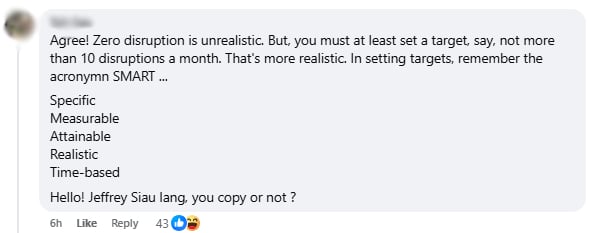
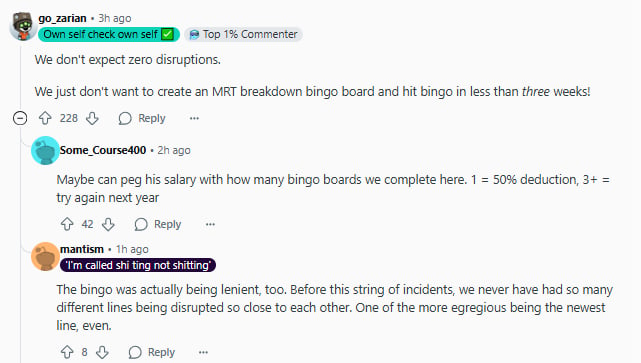
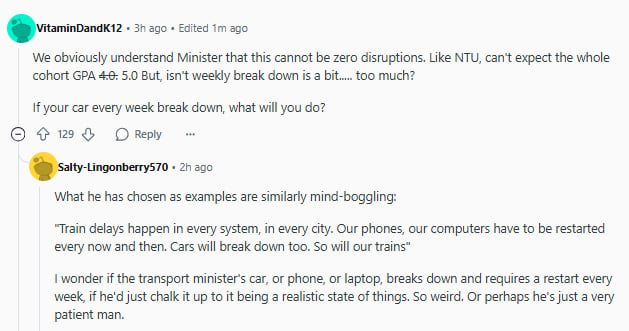
Another commented, “We are not asking for zero disruptions. What we are asking for is the reason for the sudden increase in frequency of disruptions. Attacking the straw man at its finest.”

Similarly, one user added, “Nobody is asking for zero disruptions, so I’m not sure why he’s answering a question nobody asked.”
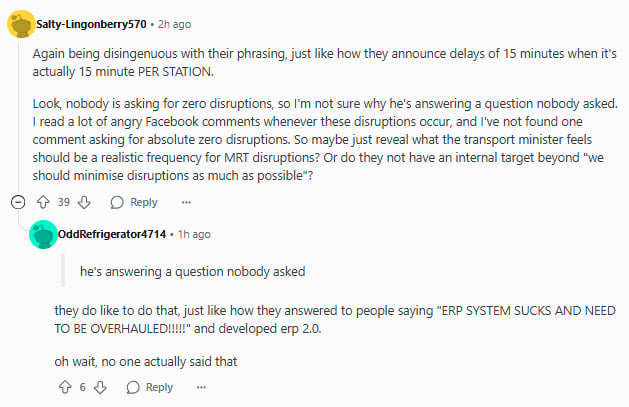
One user said “zero disruptions” had never been a goal set by Singaporeans and questioned Siow’s comparisons with rail systems in Hong Kong, Japan, and Taiwan, noting that local lines still suffer frequent breakdowns despite being newer.
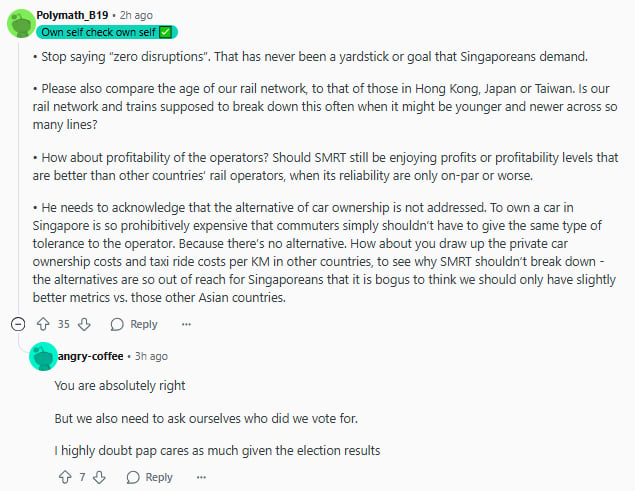
Others accused Siow of allegedly gaslighting citizens who raised concerns. A number also called on him to personally experience public transport to better understand commuters’ daily challenges.
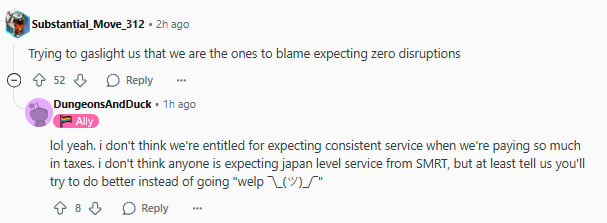
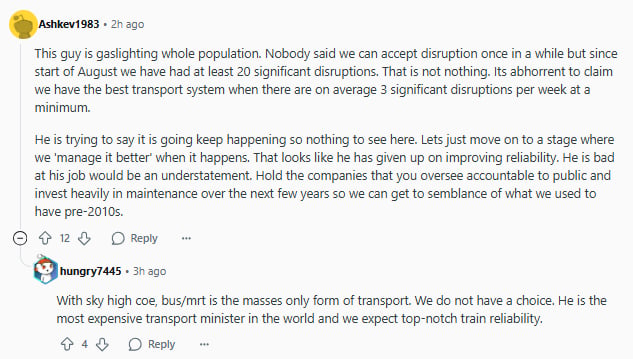
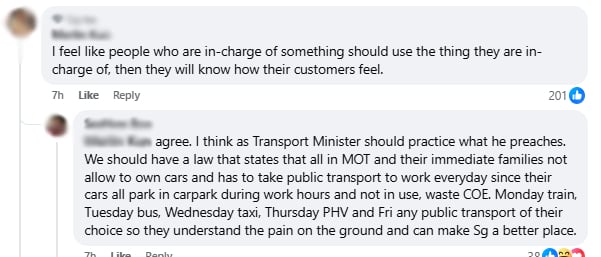

Calls for Transparency and Real Improvements
Beyond criticism, some netizens demanded greater transparency, clearer communication, and concrete preventive measures.
“I think besides being transparent, prevention action should also be published publicly, and LTA should monitor whether the vendor is committed to their plan or not,” one user said.

Another added that instead of focusing on providing more precise information, efforts should be directed towards reducing the number of incidents, noting that the breakdowns this year have been appalling.
The user stressed that there was no need for someone to point out a more suitable KPI, as the priority should simply be to reduce disruptions.
Another pointed out that although there are promises of transparency, there is little public disclosure of performance audits, procurement breakdowns, or systemic reform.
“We are asking for clarity, competence, and courage. If the system is good, prove it. If the spending was justified, show us the results,” the user said.
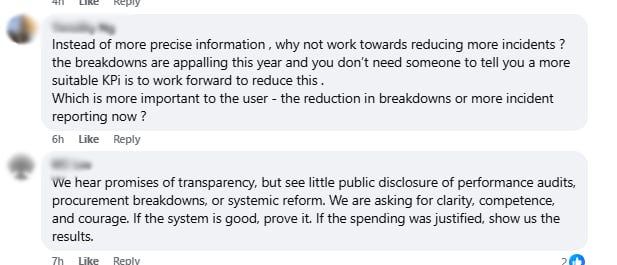
One user commented that while the public understands trains may occasionally break down, the persistence of issues despite new trains and electrical works raises concerns.
“So what is the timeline for each improvement being carried out? Which stations? What types of improvements? Don’t compare with others if we can’t even manage ourselves.”
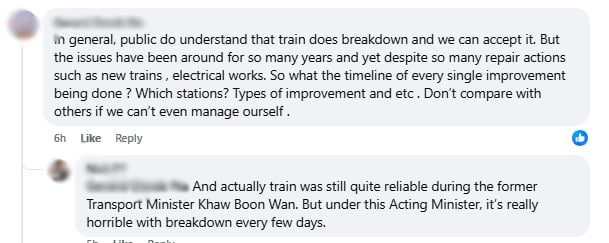
The post ‘Nobody asked for zero disruptions’: Netizens push back on Jeffrey Siow’s MRT remarks appeared first on The Online Citizen.


